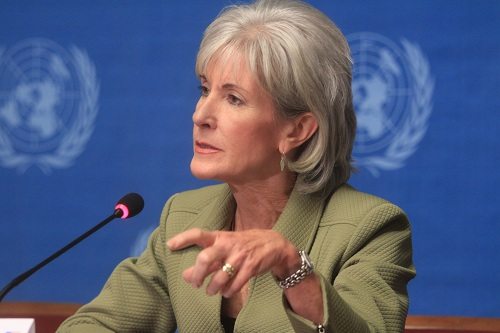
June 27, 2013; Reuters
The sequence is this: Congress finally passed the Affordable Care Act in 2010, but since then, the Republican majority in the House of Representatives has done whatever it could to starve the government of funding to implement health care reform. In an effort to get uninsured people to enroll for health insurance, Health and Human Services (HHS) Secretary Kathleen Sebelius approached H&R Block and the Robert Wood Johnson Foundation and suggested that they fund Enroll America, a nonprofit that would help get uninsured people onto health insurance, sparking Republican concerns that Sebelius might be violating federal law and federal ethics in soliciting private money for outside groups. Now, Republicans have succeeded in getting the Government Accountability Office (GAO) to agree to audit her fundraising.
Sign up for our free newsletters
Subscribe to NPQ's newsletters to have our top stories delivered directly to your inbox.
By signing up, you agree to our privacy policy and terms of use, and to receive messages from NPQ and our partners.
What was Sebelius’s motivation? She knows that without effective outreach and enrollment, the ACA will be in trouble. She responded to a House committee in early June that her efforts to raise money for Enroll were authorized by the Public Health Service Act, which allows for public-private partnerships in efforts to promote public healthcare.
What is the Republicans’ motivation? At this point, it is nothing new: another roadblock to delay and derail the Affordable Care Act, which they have failed to achieve despite 37 votes in the House to date to repeal the legislation. But if there is a GAO study—all of this has been reported verbally, with no written agreement from the GAO so far, according to Reuters—what should the audit examine? Here are our thoughts:
- How much latitude does the Public Health Service Act allow for private fundraising by the HHS Secretary? What are the implicit and explicit guidelines that an HHS secretary must follow to engage in fundraising for public healthcare needs?
- Have predecessors of Sebelius utilized this latitude under the Public Health Service Act to raise money for private nonprofits?
- Does the fact that Sebelius also called Johnson & Johnson, Kaiser Permanente, and Ascension Health—healthcare companies with a stake in the ACA—and talked about the importance of Enroll America without specifically asking for Enroll contributions alter the latitudes allowed in the Public Health Service Act?
- Since other nonprofits than Enroll America are also potentially able to help people sign up for health insurance, is there a dimension of due diligence involved in Sebelius’s promotion of Enroll to the exclusion of other potentially qualified groups? How did Sebelius select Enroll for this function?
- Since some key people in Enroll America have close ties with both the White House and Secretary Sebelius herself, how does the Secretary’s advocacy of private contributions for Enroll stand against the perception of potential conflicts of interest?
- If the Secretary solicited money for Enroll under the aegis of the law’s scope for public-private healthcare partnerships, what would be Secretary Sebelius’s responsibilities or obligations to a partnership with Enroll America, given her fundraising efforts?
- In speaking to healthcare companies, such as Kaiser and Ascension, did Secretary Sebelius say anything that the companies might have construed, even unintentionally, as offering favorable treatment or some other kind of quid pro quo, were they to provide funding to Enroll America?
- The Affordable Care Act allows the federal government to hire “navigators” and “assisters” to help people review and purchase insurance on the state and federal insurance exchanges. Wouldn’t the navigators—funded through federal appropriations, even if inadequate due to Republican budgetary truculence—be appropriately assigned the functions that Sebelius was promoting for Enroll America?
- Did the Secretary have additional conversations with potential funders of Enroll America or any other nonprofits for public-private partnerships for any other parts of the ACA?
- What other functions related to the ACA is HHS or other agencies of the federal government citing as reasons to raise private contributions for nonprofit partners in public-private partnerships?
Remember, this will be a GAO audit, and GAO works for Congress. But it doesn’t work for Democrats or Republicans. According to GAO operating standards, the independence of its audit function is crucial, as conveyed by this written standard: “In all matters relating to the audit work, the audit organization and the individual auditor, whether government or public, should be free both in fact and appearance from personal, external, and organizational impairments to independence.” The GAO will be doing an audit, not a political attack piece.
While we have noted problems with Sebelius’s fundraising and the explanations that were less than full and rapid, the GAO request looks like one of a number of continuing efforts by House Republicans to find a link between the White House and a possible scandal, as with the IRS, Benghazi, and Fast and Furious—all of which may be examples of federal government mismanagement, but not the Oval Office-directed corruption that the likes of Darrell Issa had hoped to uncover. Wouldn’t it be a pleasant change if both Congress and the White House were simply, truly interested in remedying governmental dysfunction?—Rick Cohen













